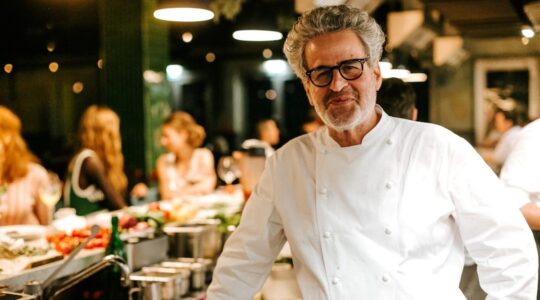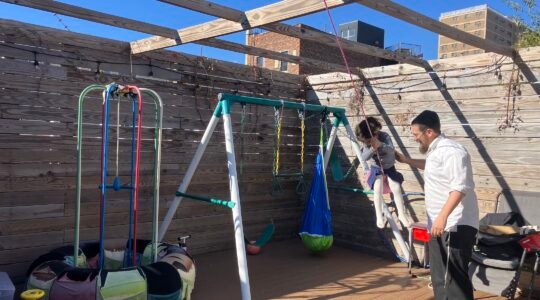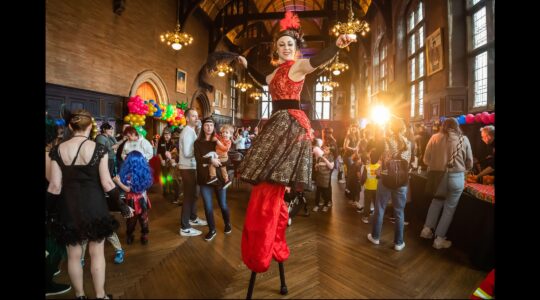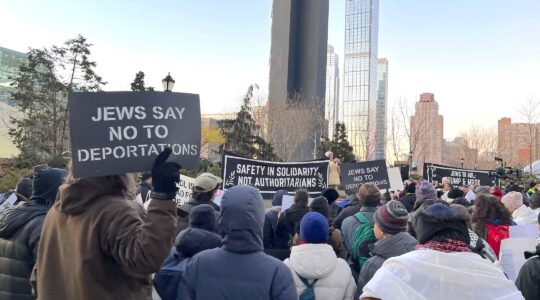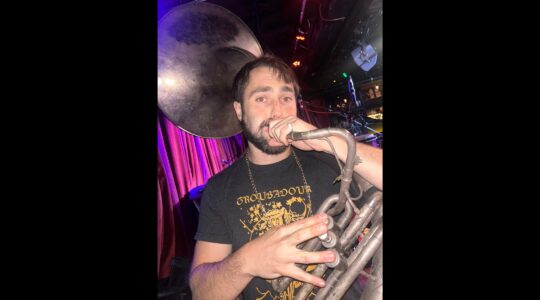It’s a most unlikely place for a musical revolution, a studio tucked into an apartment building in a quiet block in Carroll Gardens, at the intersection of a residential neighborhood and a string of mom-and-pop stores of the sort Brooklyn still has in its quieter corners. Joey Weisenberg, whose studio (along with the dozens and dozens of musical instruments it contains) this is, is an unlikely revolutionary; he’s a sweet-faced young man who is celebrating is 31st birthday by speaking to a journalist about his vision of a more user-friendly 21st-century synagogue, one built around singing and spontaneity, combining two millennia of Jewish and liturgy with the modern energies of an actively participating congregation.
It’s not hard to get a glimpse of Weisenberg’s musical manifesto. Unlike most guerrilla warriors, he’s delightfully generous with his agenda. He’ll be playing with his band on October 21 at the Eldridge Street Synagogue. He has two lively CDs, "Joey's Nigunim" and “Transformation of a Nigun: Nigunim, Vol. II,” and has authored a smart brief for his cause, “Building Singing Communities.”
The program is simple: all Weisenberg wants is to get Jews of any denomination to get up and sing in shul.
Weisenberg’s ‘eureka’ moment crept up on him slowly.
Like most multi-instrumentalists with very eclectic taste and a performing background that runs from klezmer to country, blues to flamenco, he has earned his living playing in a veritable army of wildly variegated musical groups. Born and raised in Milwaukee, he is the offspring of musicians, his mother a classical pianist with a particular affinity for Johann Sebastian Bach, his father an ardent flamenco guitarist. He began his own musical career as a harmonica and guitar prodigy in the blues clubs that proliferated in his hometown.
“I spend a lot of years as a full-time musician,” he says, his ever-present smile widening. “I was playing an average of three gigs a night, totally different kinds of events, concerts, weddings, club dates. It’s a great way to learn about what music means in the world.”
As the old saying goes, it’s a hard living but a heck of a life. But gradually, one aspect of the routine began to grate on his nerves.
“At some point I began to be bored with the frontal aspect of performing,” he says. “I mean, I began to ask why weren’t the people watching us getting more involved. I was becoming uncomfortable with the proscenium arch theatrical aspect of the experience.”
Raised as a Conservative Jew, Weisenberg has always maintained an active involvement in Jewish music. He has studied with several cantors, was an early student at Yeshivat Hadar, the small but influential independent institution on the Upper West Side.
“It’s always been a part of the fabric of my life,” he notes.
Because of the very nature of music for worship, Weisenberg realized, this was the fertile ground for his decision to move down from the stage (or the bimah) and into the midst of his audience, transforming listeners into band-mates, so to speak.
“I wanted to be in the middle of everybody; I wanted to be more of a facilitator,” he explains. “Let’s empower everybody to make music.”
He’s certainly well positioned to make that happen, at least gradually. Weisenberg is on the faculty at Yeshivat Hadar and he’s the musical director at the Kane Street Synagogue in Brooklyn.
“I was raised in a Conservative shul, but I feel non-denominational,” he says. “My grandfather belonged to all nine of the synagogues in Milwaukee when he was alive, and he told me that you could learn something from each of them.”
So he now divides his time between being a husband and father, teaching at Yeshivat Hadar, planning services at Kane Street, studying hazonos with older cantors, running workshops on the creation of what he calls “Spontaneous Jewish Choirs,” working with the occasional private student, writing new nigunim and recording. (No wonder he spent part of his birthday with a journalist.)
The reason for this spectacular commitment to Jewish music is clear in his mind.
“With music I am a believer, I never question music,” he says.
But how does music relate us to the spiritual realm?
Weisenberg’s eyes narrow and he is quiet for a moment. Then his smile slowly returns.
“For me, music teaches us how to listen,” he says. “In listening we start to hear things that are outside of ourselves, yet also deeply inside too. [When they are singing] people are interacting with one another, with the room they are in. As we learn to hear other people and hear space we begin to sense the energy around us and we start to sense the divine energy of the world.”
He pauses for a moment.
“It forges a connection between elements of our experience that have been disparate up to that point, and that’s the essence of the Sh’ma,” he says with a quiet passion. “It’s the central credo of Judaism. We cover our eyes when we recite the Sh’ma, so we’re not distracted by visual stimuli. The prayer itself links hearing and God’s oneness. If we can learn how to listen we can learn how to discover unity.”
The Joey Weisenberg Ensemble will be performing “Transformation of a Nigun” on Oct. 21 at 3 p.m. at the Museum at the Eldridge Street Synagogue (12 Eldridge St.). For information call (212) 219-0888, or go to http://www.eldridgestreet.org. To buy Joey Weisenberg’s CDs and book and to learn more about his workshops, go to http://joeyweisenberg.com.
The New York Jewish Week brings you the stories behind the headlines, keeping you connected to Jewish life in New York. Help sustain the reporting you trust by donating today.
